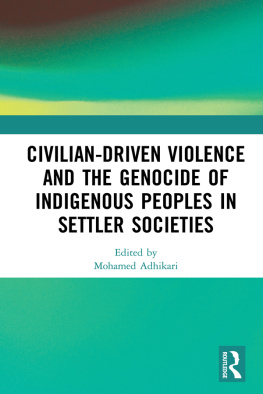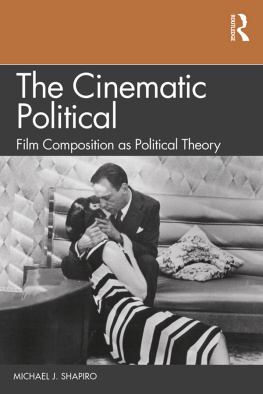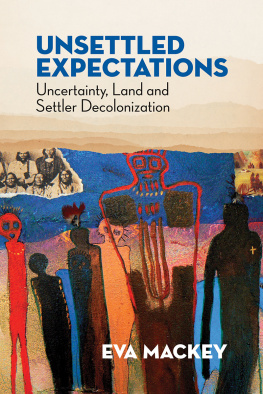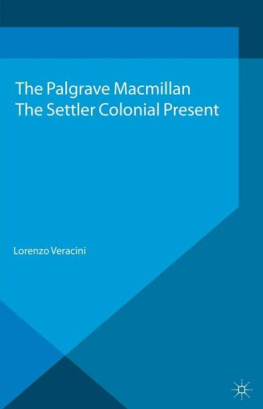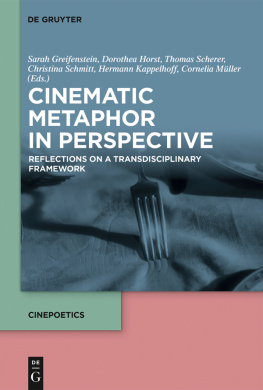
Situated at the intersection of film studies and settler colonial studies, Cinematic Settlers is an extremely valuable volume that reflects on settler colonialism as a multifaceted process that is, in fundamental ways, still ongoing and in which cinema has been, since its invention, centrally involved. With sixteen carefully considered and clearly written essays, the collection produces an understanding of settler colonialism, and the film cultures it has produced, that is grounded in historical and textual specificity on the one hand and expansive, indeed global, on the other. The result is a volume of remarkable depth and breadth that throws into fresh relief the politics of place, of representation, of identity that structure settler societies.
Corinn Columpar, University of Toronto, Canada
Cinematic Settlers challenges the field of settlercolonial studies with its ambitious geographical breadth and redefines conceptions of world cinema by interrogating the settler structures that underpin the medium. It is an essential text that spans multiple genres and historical periods to address urgent questions about the state of cinema and its role in cultivating a path beyond settlement.
Jerod RaDel Hollyfield, Carson-Newman University, USA
Settler colonialism is at the very core of modern global history. This wide-ranging collection reveals its huge impact on transnational film and popular culture.
Angela Woollacott, The Australian National University, Australia
This collection of essays on cinema from across the globe offers rich new insights on the distinct cultures settler colonialism produced by mirroring and affirming settler interests, perspectives and fantasies. The collection also tackles difficult questions of how contemporary filmmakers grapple with Indigenous critiques and post-settlement politics in diverse ways, from adopting multivocal perspectives to re-staging settler narratives in new imaginary frontiers. When representing diversity in film is such a pressing issue, this timely collection explores the deep histories and ambivalences of settler cinema.
Shino Konishi, University of Western Australia, Australia
Cinematic Settlers
This anthology adds to the burgeoning field of settler colonial studies by examining settler colonial narratives in the under-analyzed medium of film.
Cinematic Settlers discusses different cinematic genres, national traditions, and specific movies in order to expose related threads, shared circulations of knowledge, and paralleled representations. Organized into thematic groupingsconquest, settlers, natives, and spacethe contributors explore the question of how film compares to written genres and other visual media in representing and effecting settler colonialism on a global scale. Striving for inclusiveness, the volume covers different eras and settler colonial situations in Australia, New Zealand, Taiwan, Hawaii, the American West, Canada, Latin America, Russia, France, Algeria, German Africa, South Africa, and even the next frontier: outer space. By showing how films offer layered, contested, and dynamic settler colonial narratives that advance and challenge settler hegemonic readings, the essays enable students to better analyze and understand the complex history of diversity and colonialism in film.
This book is important reading for undergraduate classes on the history of empire, colonialism, and film.
Dr Janne Lahti is an Academy of Finland Research Fellow in History at the University of Helsinki, Finland. He specializes in global and transnational histories of settler colonialism, borderlands, American West, and Nordic colonialism. His books include German and United States Colonialism in a Connected World: Entangled Empires (2020), The American West and the World: Transnational and Comparative Perspectives (2019), and Wars for Empire: Apaches, the United States, and the Southwest Borderlands (2017).
Professor Rebecca Weaver-Hightower is Chair of English at North Dakota State University. Her publications include Frontier Fictions: Settler Sagas and Postcolonial Guilt (2018), Empire Islands: Castaways, Cannibals, and Fantasies of Conquest, (2007), Postcolonial Film: History, Empire, Resistance (2014, co-edited with Peter Hulme), and another collection on settler literatures Archiving Settler Colonialism: Culture, Space, and Race, (2018, co-edited with Yuting Huang).
First published 2020
by Routledge
52 Vanderbilt Avenue, New York, NY 10017
and by Routledge
2 Park Square, Milton Park, Abingdon, Oxon OX14 4RN
Routledge is an imprint of the Taylor & Francis Group, an informa business
2020 Taylor & Francis
The right of Janne Lahti and Rebecca Weaver-Hightower to be identified as the authors of the editorial material, and of the authors for their individual chapters, has been asserted in accordance with sections 77 and 78 of the Copyright, Designs and Patents Act 1988.
All rights reserved. No part of this book may be reprinted or reproduced or utilised in any form or by any electronic, mechanical, or other means, now known or hereafter invented, including photocopying and recording, or in any information storage or retrieval system, without permission in writing from the publishers.
Trademark notice: Product or corporate names may be trademarks or registered trademarks, and are used only for identification and explanation without intent to infringe.
Library of Congress Cataloging-in-Publication Data
A catalog record for this title has been requested
ISBN: 978-0-367-22998-6 (hbk)
ISBN: 978-0-367-50383-3 (pbk)
ISBN: 978-1-003-05727-7 (ebk)
A common belief of settlers around the world was that the places they were settling did not have names. Of course, settlers could see that people were already there, but the settlers chose to think of them as barbaric and savage, lacking proper religion, and without ownership. The settlers imported their laws and religion to these areas, whether in North America, Australasia, Africa, or elsewhere; and the settlers convinced themselves that as the first persons to see a mountain or a river or a new landscape, they had the right to attach their names to those places.
Moviesespecially the historical settler films known as Westernshad a role in perpetuating this perception for later generations. Films created the illusion that there were no Indigenous people as real, complicated, and rooted communities and peoples with emotions, agendas, and agency, and this illusion enhanced the settler mentality that the lands continued to be free to be taken. This cinema fostered and displayed the attitudes of settler supremacy over Indigenous peoples, feeding the formation of laws for religion and land occupancy. In films, settlers used the premise that the Indigenous people had no structured religion and did not demonstrate the white mentality of farming to indicate that it was the settlers who had the right to occupy the land. As the Western would have, there was usually a church built at the end of town, demonstrating that Christianity prevailed.
There was no consultation with the Indigenous peoples as the settlers tried to make sense of landscapes and territories that were foreign to their eyes, places that they had no relationship with, by giving those places names that made sense to themselves and thereby pretending that they owned them. Unlike Indigenous place names, which are deeply rooted in place and tell a story about the reality and characteristics of a place, those new colonial names had no real association to the place itself and were often just the names of white men who had never been to that place.




